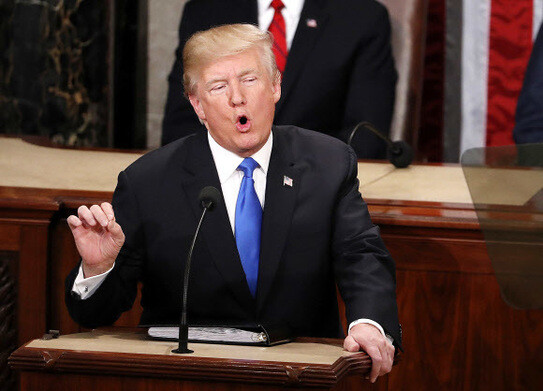hankyoreh
Links to other country sites 다른 나라 사이트 링크
[Editorial] Trump’s “bloody nose” strategy must be completely off the table

The so-called “bloody nose” strategy, referring to a limited preventive strike against North Korea, has gone public following the withdrawal of Victor Cha’s nomination as US Ambassador to South Korea. The bloody nose is one of the Donald Trump administration’s military options: a small-scale, limited surgical strike against North Korean nuclear sites or other nuclear facilities that ostensibly would not provoke a response from North Korea.
There’s no way to know how seriously this strategy has been discussed at the White House. It’s also unclear whether Cha’s nomination was withdrawn because of his opposition to the strategy or for personal reasons. But a Jan. 30 contribution from Cha to the Washington Post suggests the truth probably has something to do with a debate over the “bloody nose” approach that unfolded between hardliners and moderates during the nomination process. That’s what makes the present situation seem so serious and troubling.
To begin with the idea that North Korea “wouldn’t dare” strike back against the US is both sad and dangerous. It’s based on a US-centered mindset that equates a North Korean counter-strike with the end of the Pyongyang regime. But with Trump administration hardliners describing Kim Jong-un as “irrational and unpredictable,” it’s not clear how they are predicting he would reach the same military conclusion as them. It’s a gamble where the stakes are millions of lives.
The people advocating the bloody nose approach are either hardliners with military backgrounds or laypeople in terms of military and security issues. In most cases, their understanding of the Korean Peninsula or North Korea is close to zero. These people seem to possess authority that far outstrips their abilities. They’re also arrogant and rash.
According to Cha’s Washington Post piece, some ultra-hardliners have argued that the risk of endangering the lives of the 230,000 Americans living in South Korea if the bloody nose strategy escalates is worth taking in terms of “long-term interests” and the “safety of Americans living in the continental US.” The fates of 50 million South Koreans don’t even warrant a mention.
The reason hardline voices have gotten so much louder in the White House lately has much to do with the discussions occurring between South and North Korea for the Pyeongchang Olympics. It appears to be an attempt to stop a climate of reconciliation from forming on the peninsula. Given their lack of faith in denuclearization, they seem to believe the North Korean nuclear program will become irreversible if reconciliation occurs at a time of intensifying sanctions.
Meanwhile, the Russia scandal is raising the possibility that Trump not only faces a difficult road to re-election but could end up impeached. Depending on how the mid-term elections in November turn out, he could find himself a lame duck. This raises the troubling question of whether he might consider a strike against North Korea as a way out of his domestic political crisis.
Indeed, White House National Security Council senior director for Asian affairs Matthew Pottinger reportedly said in a recent closed-door meeting with US experts on Korean Peninsula issues that a limited strike on the North might help in the midterm elections.
This is a serious situation. The South Korean government needs to do everything in its power to convince the Trump administration to take reckless strategies like the “bloody nose” off the table completely. Seoul and Pyongyang also need to hold the military talks they agreed to when the North decided to take part in the Pyeongchang Olympics, working as quickly as possible to defuse the military crisis on the peninsula. Nursing the embers of peace that emerged with the Olympics is now a more crucial task than ever.
Please direct questions or comments to [english@hani.co.kr]

Editorial・opinion
![[Column] Park Geun-hye déjà vu in Yoon Suk-yeol [Column] Park Geun-hye déjà vu in Yoon Suk-yeol](https://flexible.img.hani.co.kr/flexible/normal/500/300/imgdb/original/2024/0424/651713945113788.jpg) [Column] Park Geun-hye déjà vu in Yoon Suk-yeol
[Column] Park Geun-hye déjà vu in Yoon Suk-yeol![[Editorial] New weight of N. Korea’s nuclear threats makes dialogue all the more urgent [Editorial] New weight of N. Korea’s nuclear threats makes dialogue all the more urgent](https://flexible.img.hani.co.kr/flexible/normal/500/300/imgdb/original/2024/0424/7317139454662664.jpg) [Editorial] New weight of N. Korea’s nuclear threats makes dialogue all the more urgent
[Editorial] New weight of N. Korea’s nuclear threats makes dialogue all the more urgent- [Guest essay] The real reason Korea’s new right wants to dub Rhee a founding father
- [Column] ‘Choson’: Is it time we start referring to N. Korea in its own terms?
- [Editorial] Japan’s rewriting of history with Korea has gone too far
- [Column] The president’s questionable capacity for dialogue
- [Column] Are chaebol firms just pizza pies for families to divvy up as they please?
- [Column] Has Korea, too, crossed the Rubicon on China?
- [Correspondent’s column] In Japan’s alliance with US, echoes of its past alliances with UK
- [Editorial] Does Yoon think the Korean public is wrong?
Most viewed articles
- 1[Column] Park Geun-hye déjà vu in Yoon Suk-yeol
- 2Why Korea shouldn’t welcome Japan’s newly beefed up defense cooperation with US
- 3[Guest essay] The real reason Korea’s new right wants to dub Rhee a founding father
- 4Will NewJeans end up collateral damage in internal feud at K-pop juggernaut Hybe?
- 5Thursday to mark start of resignations by senior doctors amid standoff with government
- 6N. Korean hackers breached 10 defense contractors in South for months, police say
- 7[Column] ‘Choson’: Is it time we start referring to N. Korea in its own terms?
- 8Kim Jong-un expressed ‘satisfaction’ with nuclear counterstrike drill directed at South
- 9[Editorial] New weight of N. Korea’s nuclear threats makes dialogue all the more urgent
- 10Senior doctors cut hours, prepare to resign as government refuses to scrap medical reform plan